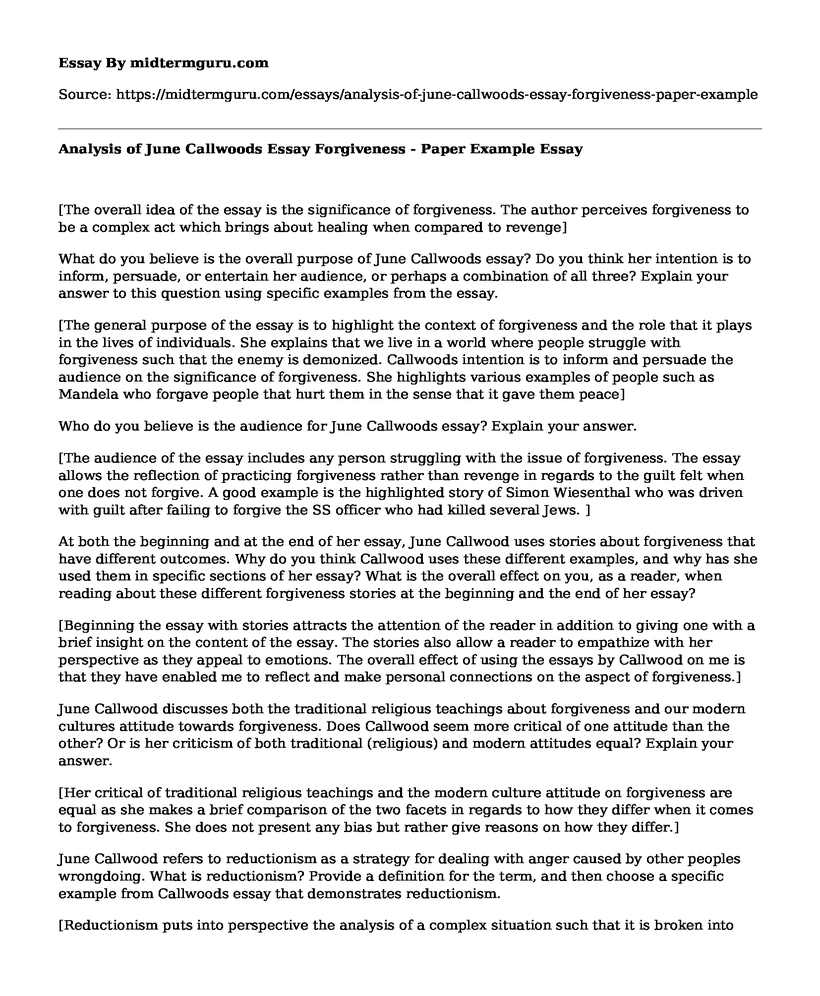[The overall idea of the essay is the significance of forgiveness. The author perceives forgiveness to be a complex act which brings about healing when compared to revenge]
What do you believe is the overall purpose of June Callwoods essay? Do you think her intention is to inform, persuade, or entertain her audience, or perhaps a combination of all three? Explain your answer to this question using specific examples from the essay.
[The general purpose of the essay is to highlight the context of forgiveness and the role that it plays in the lives of individuals. She explains that we live in a world where people struggle with forgiveness such that the enemy is demonized. Callwoods intention is to inform and persuade the audience on the significance of forgiveness. She highlights various examples of people such as Mandela who forgave people that hurt them in the sense that it gave them peace]
Who do you believe is the audience for June Callwoods essay? Explain your answer.
[The audience of the essay includes any person struggling with the issue of forgiveness. The essay allows the reflection of practicing forgiveness rather than revenge in regards to the guilt felt when one does not forgive. A good example is the highlighted story of Simon Wiesenthal who was driven with guilt after failing to forgive the SS officer who had killed several Jews. ]
At both the beginning and at the end of her essay, June Callwood uses stories about forgiveness that have different outcomes. Why do you think Callwood uses these different examples, and why has she used them in specific sections of her essay? What is the overall effect on you, as a reader, when reading about these different forgiveness stories at the beginning and the end of her essay?
[Beginning the essay with stories attracts the attention of the reader in addition to giving one with a brief insight on the content of the essay. The stories also allow a reader to empathize with her perspective as they appeal to emotions. The overall effect of using the essays by Callwood on me is that they have enabled me to reflect and make personal connections on the aspect of forgiveness.]
June Callwood discusses both the traditional religious teachings about forgiveness and our modern cultures attitude towards forgiveness. Does Callwood seem more critical of one attitude than the other? Or is her criticism of both traditional (religious) and modern attitudes equal? Explain your answer.
[Her critical of traditional religious teachings and the modern culture attitude on forgiveness are equal as she makes a brief comparison of the two facets in regards to how they differ when it comes to forgiveness. She does not present any bias but rather give reasons on how they differ.]
June Callwood refers to reductionism as a strategy for dealing with anger caused by other peoples wrongdoing. What is reductionism? Provide a definition for the term, and then choose a specific example from Callwoods essay that demonstrates reductionism.
[Reductionism puts into perspective the analysis of a complex situation such that it is broken into small parts such that it is understood. An example in the essay that demonstrates this aspect is the example of Hillary Clinton whereby the author states, Hillary Clinton apparently forgave her sleazy husband because she knows he had an unhappy childhood (Callwood, 2015). In this example, Hillary analyzed the behavior of her husband such that she came to an understanding of his actions and hence resulting in forgiveness]
Towards the end of her essay (starting in 15), Callwood describes a process of forgiveness. Does Callwood appear to have a positive or negative view of this process? Explain your answer.
[Callwood has a positive view of the forgiveness process whereby she explains that it results in peace of mind despite of it being a challenge.]
References
Callwood, J. (2015). Forgiveness. In J. Van Rys, R. VanderMey, V. Meyer, & P Sebranek (Eds.) Writing Life: A Canadian Students Guide to Thinking, Writing, and Researching (pp. 177-180). Toronto, ON: Nelson Education Inc.
Cite this page
Analysis of June Callwoods Essay Forgiveness - Paper Example. (2021, Jun 02). Retrieved from https://midtermguru.com/essays/analysis-of-june-callwoods-essay-forgiveness-paper-example
If you are the original author of this essay and no longer wish to have it published on the midtermguru.com website, please click below to request its removal:
- Paper Example on Philosophy: Brave New World and Utilitarianism
- Therapeutic Interview Paper Example
- Paper Example on College Student Stress
- Interview Example: Aging
- Exercise Effects on Psychological Function - Speech Example
- Daniel Gonzalez Case Study
- The Proteostasis Network: Preserving Cellular Balance in Aging - Essay Sample







